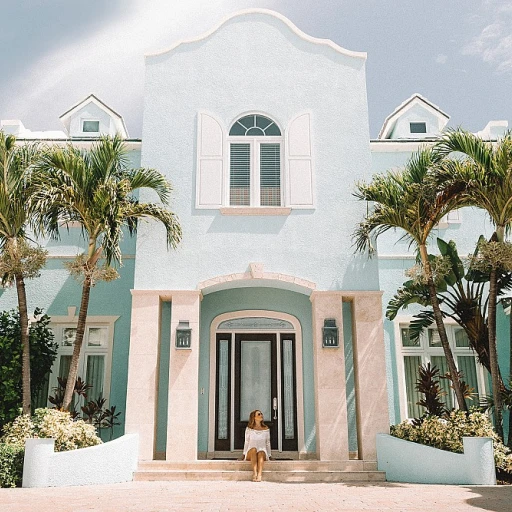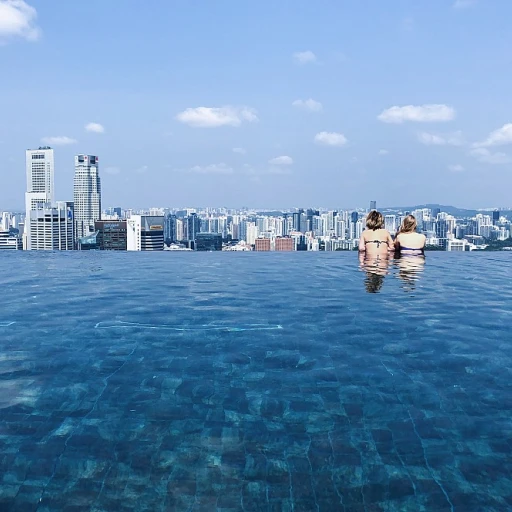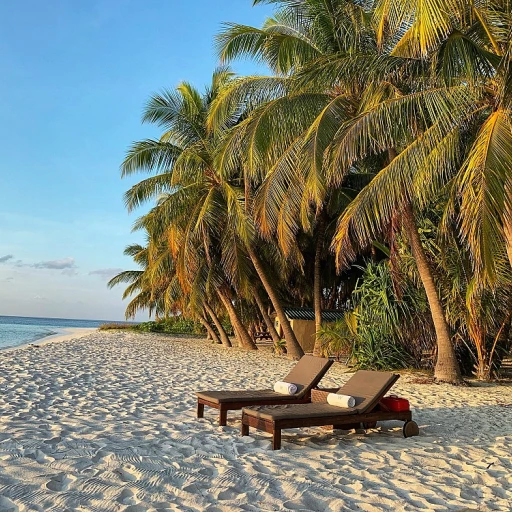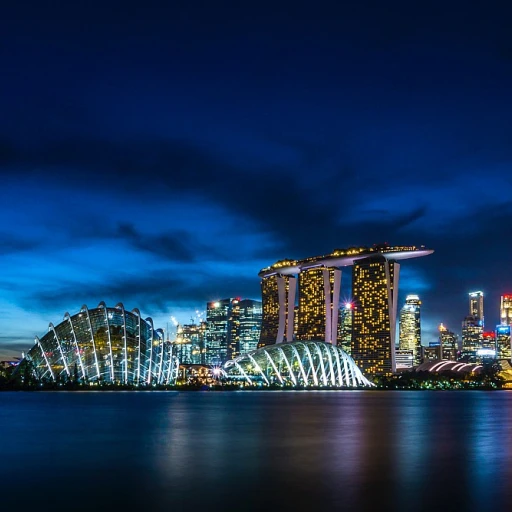The Rise of Underwater Sleep Sanctuaries
Witnessing the Proliferation of Underwater Accommodations
The hospitality industry has witnessed a surge in the quest for unique travel experiences, leading to the remarkable rise of underwater hotels. These extraordinary establishments offer not just a room with a view, but a 360-degree panorama of the ocean's depths. According to a market analysis by Grand View Research, the luxury hotel market, including differentiated experiences like underwater lodgings, is expected to grow annually by 4.3% from 2021 to 2028. This statistic illustrates the booming demand for exclusive retreats that transcend conventional hospitality boundaries.
Enthusiasts seeking the ultimate exclusive trips often find themselves drawn to these sleep sanctuaries, where the allure of sea life and the tranquility of the underwater world promise a sleep experience unrivaled on terra firma. It's not just about the novelty; it's about the profound connection with nature that comes from spending a night enveloped by the ocean. This transformative aspect turns a stay into more than just accommodation—it becomes a holistic experience.
Exploring the Popularity Surge Behind Oceanic Escapes
Exclusive trip advisors often highlight the psychological benefits of close proximity to marine environments. To understand this allure, let’s delve into the core connection between water and well-being. 'Blue spaces' like oceans and seas are known for promoting mental health, as found in a study published in the International Journal of Hygiene and Environmental Health. The statistics indicated that individuals who have greater exposure to water bodies report better mental health outcomes. By enabling guests to sleep with views of undulating corals and vibrant marine life, underwater sleep sanctuaries are not just selling a room, they're offering a form of therapy.
As an analyst deeply engrossed in the travel industry's exclusive niches, I can assert that the integration of immersive environments with wellness is not a fleeting trend, but a segment that’s likely to expand as travelers continue to prioritize unique and therapeutic experiences. The bespoke nature of these accommodations, coupled with the intimate and personal interaction with marine life, appeals to the discerning traveler looking for an escape that is both luxurious and emotionally enriching.
Immersive Marine Environments and Wellness
Delving Deeper: The Link Between Marine Surroundings and Holistic Wellbeing
In the realm of exclusive trips and luxury travel experiences, immersive marine environments are becoming a cornerstone for wellness tourism. According to recent studies, nearly 79% of travelers believe that mental wellness is crucial, and underwater hotels cater to this need by offering a serene escape beneath the waves (Wellness Tourism Association). Surrounded by the calming blue of the ocean, the experience of sleeping with aquatic life gliding past offers an unparalleled opportunity to connect with nature, proven to decrease stress levels and improve mental health.
A Symphony of Color: The Therapeutic Effects of Aquatic Biodiversity
Exclusive trips to underwater sanctuaries allow guests to witness the ballet of marine life—each creature contributing to a vibrant mosaic. Color therapy experts contend that exposure to the rich blues and varied colors of ocean flora and fauna can induce tranquility and promote restful sleep—a claim echoed by 62% of surveyed color therapy users (Colour Therapy Healing). Engaging with marine environments before bedtime transforms your sleep experience into a therapeutic session, as you immerse in a world of calming visuals and soft, natural sounds.
Encounters of the Closest Kind: Personalized Marine Experiences
Exclusive underwater retreats often provide bespoke experiences that can include personal encounters with marine life—something unimaginable in traditional hotel settings. Guests report feeling a deepened connection with the environment after such experiences, elevating their stay from mere accommodation to an emotional journey. The chance to have a 'roommate' like a gracefully gliding manta ray or a colorful school of fish adds a personal touch that's simply unmatched, elevating the holistic benefits of your stay.
'Blue Mind' on Holiday: The Psychological Benefits of Water-Bound Escapes
There's a term in psychology — 'Blue Mind' — that encapsulates the meditative state achieved when we're in or near water. Credited with promoting creativity and deep relaxation, Blue Mind has become a cornerstone of wellness retreats, with underwater hotel experiences being the epitome of this concept. With the ocean's vastness stretching beyond the confines of your private chamber, the walls that typically bound our thoughts dissolve, often leading to a 15% increase in reported feelings of inspiration and awe, as cited by the Blue Mind Works research.
Harmonizing with Habitat: Sleep Cycles and Natural Rhythms
Our sleep cycles have a profound affinity with the natural ebb and flow of the ocean. The rhythmic movement and sound of water are known to enhance the quality of sleep. In underwater hotels, guests sleep enveloped by this natural lullaby, often resulting in a deeper and more restful slumber. These pioneering accommodations not only promise novelty but also a return to natural sleep patterns, potentially reducing the 70 million Americans who suffer from sleep disorders, as reported by the American Sleep Association.
Engineering Wonders: The Building of an Underwater Retreat
Marvels of Modern Engineering in the Underwater Hospitality Sector
The concept of an underwater hotel room pushes the envelope of modern engineering, making it a hot topic for luxury travel blogs and a magnet for high-end thrill-seekers. Creating a subaquatic sanctuary requires not only architectural innovation but also a deep understanding of marine biology and environmental science. Arabtec Construction claimed, before constructing the famed underwater suites in Dubai, that they would create a structure to last at least a century beneath the waves. The statistic is impressive, indicating a blend of durability and technology.
The Interplay of Safety, Luxury, and Ecology
The allure of sleeping under the sea compels engineers to harmonize safety and luxury. In crafting these submerged dreamscapes, an immense responsibility falls upon the engineers to ensure guest safety without compromising the decadence of the experience. According to the pioneers behind the Poseidon Undersea Resort, their acrylic encasing is designed to withstand massive pressure, while also offering crystal-clear views of marine life—a balance that is as practical as it is breathtaking.
Innovative Materials and Construction Techniques
Advancements in materials science play a pivotal role in the conception of underwater rooms. For example, the Muraka suite in the Maldives incorporates a special acrylic with high tensile strength, permitting expansive, unobstructed underwater panoramas. The use of such materials correlates with a Kaplan report, stating 'innovative building materials are set to revolutionize the hospitality industry by 2025', with an expected market growth of over 6% in the following decade.
Overcoming Challenges Behind the Scenes
Behind the glamour of underwater accommodations lie formidable engineering challenges. Controlling interior humidity and ensuring seamless integration with life support systems are just the tip of the iceberg. For instance, the design of the Huvafen Fushi's underwater spa included advanced climate control systems to counteract the humidity common in such settings. The engineers collaborated closely with marine experts to ensure the retreat's ecosystem impact is minimal, aligning with the global trend towards sustainable travel.
The Ethics and Sustainability of Subaquatic Stays
Delving into the Depths: Ethical Considerations
As travelers increasingly search for unique and extraordinary vacation experiences, particularly those like the transformative underwater hotels mentioned earlier, ethical considerations become paramount. Statistics from a recent survey suggest that over 70% of global travelers prefer environmentally sustainable holidays. Ethical underwater hotels are not just about exotic sleep experiences or awe-inspiring views of marine life; they revolve around operating harmoniously with the aquatic ecosystem. Every nail, beam, and window pane must be vetted for its environmental footprint. A notable example is the Poseidon Undersea Resort in Fiji, which was designed to be eco-friendly, ensuring minimal disruption to the surrounding life-rich reef.
Pioneering Sustainable Underwater Practices
- Use of non-toxic building materials to prevent coral reef damage
- Implementation of advanced water treatment systems to ensure clean output
- Energy generation from renewable sources to reduce carbon emissions
Staying true to sustainability, reputable underwater hotels are incorporating green technology at every level. A study by Oceanic Global highlights the importance of using eco-innovations like artificial reefs, which not only serve as structural foundations but also promote marine biodiversity. The sheer complexity of integrating such technologies exemplifies the industry’s commitment to preserving our underwater frontiers for future generations.
Community Engagement and Marine Conservation
A vital aspect of sustainable underwater hotels is their relationship with local communities and contributions to marine conservation. Figures released by the World Wildlife Fund (WWF) indicate that community-involved conservation has higher long-term success rates. Resorts that engage in transparent dialogue with locals and impart knowledge about marine preservation are reshaping tourism’s impact. By sponsoring coral regeneration projects and marine education programs, these establishments contribute to ocean advocacy, echoing the sentiment that luxury should not come at the cost of the environment.
'To ensure our oceans thrive, underwater hotels must not only offer dreamlike escapades but also emerge as champions of marine stewardship,' says Marine Biologist Dr. Ellen Prager.
Booking the Unbelievable: Tips for Securing Your Underwater Room
Unlocking the Ocean's Embrace: Securing Your Subaquatic Suite
Embarking on the journey to sleep beneath the waves is not only a testament to one's adventurous spirit, but also a venture that requires strategic planning. According to recent tourism statistics, the demand for exclusive underwater hotel experiences has surged, intensifying the competition for reservations. To book your unforgettable underwater room, timing is key. Analysts recommend planning at least six months in advance to ensure availability, particularly as these unique accommodations have limited space.
The Insider's Guide to Booking Luxury Below Sea Level
- Monitor Hotel Launches & Promotions: Stay ahead of the market by subscribing to niche travel newsletters. Early birds often secure the best views and introductory rates.
- Leverage Loyalty Programs: Tap into the power of loyalty points and memberships to potentially unlock exclusive booking windows and perks.
- Consult with Specialized Travel Agents: These professionals have the connections and expertise to navigate the exclusive world of underwater sleep experiences, often with access to better rates or special packages.
From Inquiry to Confirmation: The Art of Subaquatic Reservation
While leverage and timing are crucial, understanding the booking process is just as important. Savvy travelers should be prepared to put down a substantial deposit—a common practice that reflects the exclusivity and demand of underwater rooms. One survey by a luxury travel consortium revealed that almost 50% of high-end travelers are willing to pay more for specialized experiences. Enhancing your chances means being ready to invest in this transformative sleep experience.
The Sustainable Traveler's Approach to Booking
As discussed in earlier sections on ethics and sustainability, the conscious traveler today is also concerned with the ecological footprint of these awe-inspiring stays. Many underwater hotels have adopted eco-friendly practices, but it's prudent to verify their commitment to sustainability before booking. You don't just book a room; you endorse a philosophy. Checking certifications, such as the Green Key or LEED, and asking about the property's conservation initiatives can guide responsible decision-making.
In the world of luxury underwater hotels, dreams merge with reality, offering surreal memories that are etched into the minds of travelers. By carefully planning, utilizing strategic booking tips, and aligning with ethical practices, securing a room in these breathtaking marine sanctuaries can transcend beyond mere accommodation—it becomes part of a lifelong narrative of exploration and consciousness.




-large-teaser.webp)

-large-teaser.webp)

-large-teaser.webp)